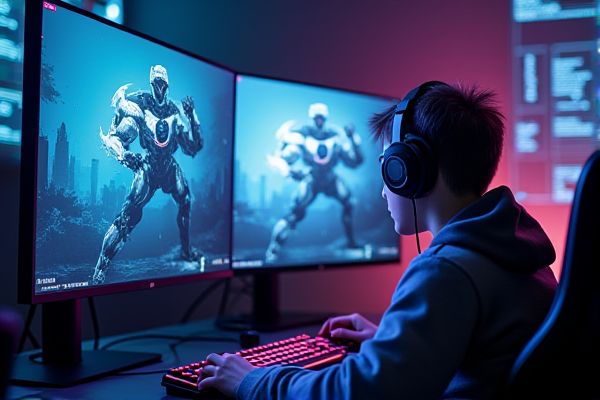
AI has transformed competitive gaming and eSports by enhancing player performance through personalized training regimens and real-time analytics. Tools powered by machine learning analyze gameplay to identify strengths and weaknesses, offering tailored feedback for improvement. Automated matchmaking systems use AI to create balanced competitions, ensuring fair play and an engaging experience. Furthermore, AI-driven tools for content creation and broadcasting enrich viewer engagement, making eSports more accessible and entertaining.
AI usage in competitive gaming eSports
Real-time Strategy Optimization
AI usage in competitive gaming, particularly in real-time strategy optimization, offers the potential for enhanced gameplay and strategic decision-making. For example, platforms like OpenAI's Gym provide environments where AI can learn to optimize resource management and unit deployment. This could lead to players gaining a significant advantage over their opponents by using AI-driven insights for tactical maneuvers. The integration of such technology may reshape training methodologies within eSports organizations, maximizing player performance during competitions.
Player Performance Analytics
The integration of AI in competitive gaming eSports enables precise player performance analytics, potentially enhancing strategic decision-making. For instance, platforms like Mobalytics leverage AI to break down gameplay data, identifying strengths and weaknesses. This enhances a player's opportunity to refine their skills and adapt to opponents. The possibility of using AI-driven insights can also lead to more personalized training sessions tailored to individual gameplay styles.
Game Balance and Fairness
AI can enhance competitive gaming in eSports by analyzing player behavior to improve game balance. For instance, machine learning algorithms can detect skills disparities in players, enabling developers to adjust game mechanics accordingly. This could lead to fairer matches and a more engaging experience for players and spectators alike. Such advancements may attract more participants and audiences, ultimately benefiting institutions like tournament organizers and game developers.
Anti-cheat System Implementation
The implementation of anti-cheat systems in eSports can significantly enhance fair play by detecting and preventing cheating behaviors. These systems utilize AI algorithms to analyze player actions, identifying anomalies that suggest illicit behavior. For example, applying machine learning models developed by institutions like MIT can improve detection accuracy and response times. Such advancements not only promote integrity but also attract more players and audiences to competitive gaming events.
Matchmaking Efficiency
AI can improve matchmaking efficiency in competitive gaming eSports by analyzing player performance and behavior patterns. This technology may lead to more balanced matches, increasing the chances of player satisfaction and engagement. For example, platforms like Riot Games employ AI algorithms to enhance team compositions. The overall player experience may be significantly improved, offering a more enjoyable gaming environment.
Training Simulations for Players
AI can significantly enhance competitive gaming in eSports by providing tailored training simulations for players. By analyzing individual gameplay data, AI creates customized scenarios that can focus on specific weaknesses, offering a chance to improve skills effectively. For example, institutions like the University of California, Irvine, have explored AI's integration within their eSports programs to boost player performance. This targeted approach could lead to a competitive edge in tournaments and improve overall player development.
Audience Engagement Enhancement
AI can enhance audience engagement in competitive gaming eSports by providing tailored content and insights during live events. For example, analysis of player performance metrics can create dynamic commentary that keeps viewers informed and invested. The use of AI-driven algorithms can help to predict match outcomes, adding an element of excitement for fans. This technological integration has the potential to transform the viewing experience, making it more immersive and interactive.
Prediction and Outcome Analysis
AI can analyze player performance and predict outcomes in competitive gaming, offering teams a strategic advantage. By processing vast amounts of data, AI models can identify patterns and behaviors, helping teams like Team Liquid refine their strategies. Machine learning algorithms make it possible to forecast potential match results based on historical data, increasing the chance of success. Using AI in eSports could enhance training methodologies and game tactics, ultimately improving overall performance in tournaments.
Data-driven Game Design Improvements
AI can enhance competitive gaming in eSports by analyzing player behavior and optimizing game mechanics. Data-driven insights might lead to more balanced gameplay, significantly improving player experience and engagement. For instance, companies like Riot Games implement AI to fine-tune character abilities in titles such as League of Legends. This tailored approach could increase player retention and satisfaction, providing a potential edge over competitors.
AI Coaching and Skill Development Tools
AI-driven coaching tools in competitive gaming eSports can analyze player performance and identify areas for improvement. These platforms, like GYO Score, utilize data to offer personalized training plans, enhancing players' skills more effectively. The possibility of using AI for real-time strategy adjustments during matches may increase a team's chance of winning. Gamers who adopt these technologies could gain a competitive edge in tournaments and leagues.
 techknowy.com
techknowy.com